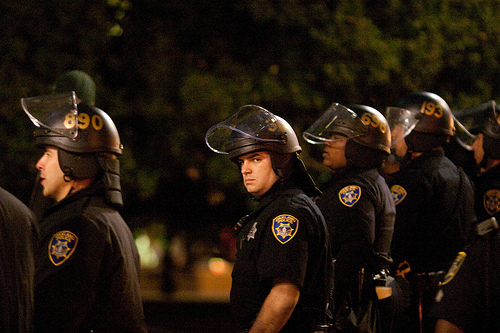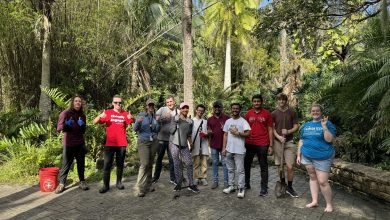Ferguson and Others – What’s to Learn?
I’m not a cop anymore, haven’t been for ten years. I teach Criminal Justice now. Just the same, I have opinions about things law enforcement, opinions I consider informed, the result of experience, education, and critical thinking. There are opinions I won’t form or offer, such as what really happened in Ferguson, MO on August 9, 2014. I have no idea. The facts are not in. I also have no personal knowledge of events in New York City or other locales where unarmed black males have been killed by police during various encounters. Even so, there are things I can speak on. There is much to learn and much to do in the aftermath of these incidents.
First, a common denominator in many encounters with unarmed suspects is the inability of the officer(s) to physically control the suspect. Again, I am not writing of the recent events or criticizing; I don’t have the facts. Often it is a totality of the circumstances, but sometimes lax or improper training is involved. I’m the first to admit that when I was a cop I was not physically prepared for hands-on encounters. I was lucky in that I was never injured and never injured anyone due to my lack of ability. Think what you want, but there were a lot of us, and I bet there still are. I was privileged to work with a handful of officers who were absolutely prepared. They practiced on their own, from simple arm-bars and take downs to full-on martial arts. When they had a physical encounter it was over in a matter of seconds, the suspect might be sore, but was almost never seriously injured, and amazingly enough, the suspects seldom complained about their treatment. The officers had the ability and confidence, but also an attitude, which I will get to later.
Even prior to the recession police budgets were being cut to the bone, and training is a frequent target of the bean counters. Why pay cops to be off the street? Well, if the training budget of Ferguson and environs was cut like our local agencies, ask them (when things calm) how that worked for them. They probably could have done a lot of training for the overtime in the last week. It might not have made any difference in this case, but what if it could have? My more adept friends would tell us that to accomplish it successfully, defensive tactics must be practiced regularly and repeatedly to make the skills second nature. Find me agencies doing more than periodic firearms qualification, sexual harassment training, maybe some mandatory diversity classes and collision avoidance. If 25% do more I’d be surprised. The public demands lower taxes, doing more with less, and training is the soft underbelly of the budget. Even tuition reimbursement for Criminal Justice programs is cut to the bone or non-existent in many agencies.
Now about attitude. I recently attended a seminar by the Southern Police Institute on Increasing Police Legitimacy Through Procedural Justice. The police need to be seen by the public as legitimate, having the authority to accomplish the public safety mission. The decisions of the police need to be accepted by the public at large. public responds to authority they perceive as legitimate with voluntary cooperation and compliance with the law. Procedural Justice is the 21st Century take on gaining respect. Procedural Justice requires the police to allow public participation, to give them a voice. Often this is simply letting all the parties explain their point of view before deciding an action. Is there always time? No, of course not, but stay with it.
The second precept is neutrality, to be unbiased and no allow personal views to interfere with the action. Will the public always believe that? Not always, and in Ferguson not for a long time, but perhaps someday. After all, our lecturer on the topic was from Chicago PD, where they teach this to their officers now, and are experiencing successful outcomes after a long history of phone book confessions, among other problems.
Third is a commitment to treating everyone with dignity and respect. I knew cops who couldn’t talk to anyone with it being an order, others who cursed or used belittling language. Remember my defensive tactics friends? Almost 100% respect and polite treatment, often in the face of provocation, until it simply didn’t work anymore. Then when it was over, it was over and the suspect was a human being again. Few complaints, fewer problems.
The final component of Procedural Justice is public trust in the motives of the decision maker. If they don’t trust your motives, they won’t trust anything you do. That’s the key problem between police and the community today, black, white, Latino, Asian. Maybe different levels by race, ethnicity, or economic status, but mistrusted motives just the same.
A key point is that most of the cops I wrote of above, the ones dedicated to being able to handle physical threats, were also already practitioners of Procedural Justice. Angry words and slurs never passed their lips. Most, in the black community, were held in esteem. Angry people would immediately gravitate to them, confident they would be heard and respected. If physical conflict erupted, afterwards the arrestee would apologize to the officer. Just having one of them show up could quell a disturbance.
I hope that government starts funding training again. Foe safety’s sake, get some defensive tactics in, but for the long term look at Procedural Justice or something like it, to build some trust in the community, and gain legitimacy, so that the aftermath of incidents as of late is not destruction and violence, but dialogue and patience. Like defensive tactics, a daylong seminar won’t cut it. Chicago is using three sessions over a six month period – teach, reinforce, and follow-up, to change the culture. I am not naive, none of this is simple, but police are losing right now, and therefore without action nothing but more trouble will follow.
I have more thoughts, but this entry is getting long. I’m also blatantly promoting our Bachelor’s Degree programs in Criminal Justice, so I have to plug them. It’s not job security; I actually believe we need college educated officers, who get some practice at critical thinking, problem solving, and time management before, and maybe during, a public safety career. I take it right back to tax investment. Those three skills get little time in a four-month academy.
photo credit: <a href=”https://www.flickr.com/photos/thomashawk/3178486033/”>Thomas Hawk</a> via <a href=”http://photopin.com”>photopin</a> <a href=”http://creativecommons.org/licenses/by-nc/2.0/”>cc</a>
photo credit: <a href=”https://www.flickr.com/photos/thomashawk/12825593233/”>Thomas Hawk</a> via <a href=”http://photopin.com”>photopin</a> <a href=”http://creativecommons.org/licenses/by-nc/2.0/”>cc</a>






